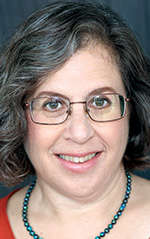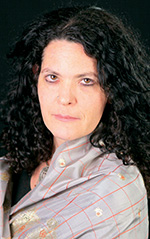Human Rights and U.S. Foreign Policy: A Frank Discussion
A diplomat and an activist talk candidly about how to work together.
BY ANNIE PFORZHEIMER AND HEATHER BARR
The role of the U.S. government in supporting human rights is a topic of nearly constant controversy and debate. Annie Pforzheimer and Heather Barr have worked together to advocate for women’s rights in Afghanistan since the Taliban takeover. This collaboration prompted discussions about U.S. policy vis-à-vis human rights, in Afghanistan and elsewhere, and the sometimes-contentious role of human rights advocates in seeking to influence that policy. We invited them to compare notes.
Annie Pforzheimer: Here is something I have always wanted to know: When activists make requests of the U.S. government, are those the actual things they want or are they positioning something extreme in order to get to a worthwhile compromise?
Heather Barr: Those are things Human Rights Watch, at least, actually wants. Our compass is always international human rights law, and it’s clear and usually fairly strong. For example, the Convention on the Elimination of All Forms of Discrimination Against Women (CEDAW) states that parties must take all steps to guarantee women “the exercise and enjoyment of human rights and fundamental freedoms on a basis of equality with men.” There isn’t a single country on the planet that has achieved this, but that’s what the convention says, and that’s what we want. The United States has signed but not ratified CEDAW, which is shameful. But women in the U.S. want full equality, too; and we want it for them.
A frequent internal discussion is how to react when there is an opportunity for partial reform. We always want to think carefully through how we can be as helpful as possible to activists in-country who are working for smaller goals, while still being consistent about always calling for full respect for the rights people have under international law.
So no, when we walk into a meeting with a diplomat, we aren’t thinking, “Let me ask for something super extreme, and then maybe we’ll get to some midpoint, which is what we really want.” I remember when I interviewed for my job, and they asked me how I manage frustration when nothing seems to work. I said it’s about managing your own expectations of what success looks like—sometimes success can even be things getting worse a tiny bit more slowly because of your efforts. On Afghanistan today, I dream of that kind of “success.”
So here’s one for you. How much space is there for diplomats to argue internally for principled approaches to human rights, and what pushback do diplomats face when they do so? And will human rights always be deprioritized under other interests such as national security?
AP: “It depends.” Classic State Department answer.
Human rights are a worthwhile policy consideration and are usually treated as such, both as a standalone “right thing to do” and also because they are key to big-picture goals of regional stability, national prosperity, and representational governments. Many specific U.S. laws and policies enshrine human rights. And we’re required to write an annual report evaluating their status. That “Human Rights Report” represents an opportunity within embassies and the department to talk to local dissenting voices and criticize even friendly governments, and to create an objective and agreed-on U.S. government record of what is actually happening, which is the best basis for policymaking.
I respect what you say about the importance of international law, but in practice the space to argue this can depend on a wide variety of factors. As they say in government-speak, those factors include but are not limited to: the mood of the White House or Congress toward having an activist foreign policy; the relative importance of a country and what else the U.S. looks for in the relationship; the latest headlines; where we are in an electoral cycle; a crisis somewhere else that requires our tools of international influence; the history of what we’ve tried previously; trends in policymaking; the existence of international media on the scene; classified information that makes the situation more complicated than it looks to the public; whether or not there is a principled and nonviolent movement for human rights in that country.
Finally, with respect to priorities within foreign policy, national security—per the Constitution’s phrase “provide for the common defense”—is the U.S. government’s highest task, but I’d argue that human rights is national security. Governments that respect their own citizens are better allies, bring stability to their regions, and work with us to protect other American interests.
So what do you think: Should human rights be seen as one issue set among many, or are they foundational to all the others?
HB: We see them as very much foundational.
A good example of this is the discussion about transitional justice. We saw this clearly in Afghanistan, where survivors and activists were calling for accountability for human rights violations perpetrated by many different governments and international actors, stretching back decades. The Karzai and Ghani administrations in Afghanistan shut down those efforts, with strong support from a lot of foreign diplomats who often told us privately that there were more pressing issues—that there needed to be an end to the conflict in Afghanistan and stability in the country. Our response was that failing to deal with past atrocities was a major barrier to exactly the kind of peace and stability diplomats from the U.S. and elsewhere and Afghan government officials were saying was a prerequisite. I don’t claim that this dynamic explains the whole human rights disaster that Afghanistan is today, but it certainly didn’t help.
Similarly, women’s full participation in all peace processes—for which everyone should be on board since U.N. Security Council Resolution 1325, adopted in 2000, requires it—is forgotten all the time. It didn’t surprise anyone working on women’s rights, though, when research by the U.N. and others started to show that women’s participation made it more likely that a deal to bring peace would be reached and that it would be implemented.
Afghanistan today can, unfortunately, be seen as an example of what happens when rights are not seen as foundational. What has happened there involved a deal—between the U.S. and the Taliban—made without the participation of the Afghan government and with zero Afghan women at the table. As we know, that deal brought nothing resembling peace to Afghan women.
So, Annie: What kind of training do U.S. diplomats get—and what kind of guidance do they receive—from the State Department and, in particular, the Foreign Service Institute, about the importance of and the role of diplomats regarding human rights?
How much space is there for diplomats to argue internally for principled approaches to human rights?
–HB
AP: For me, human rights training was incorporated into a three-week “Political Tradecraft” course, with elements on reporting on human rights, drafting the annual reports, and adjudicating the Leahy Law for security training. Human rights training is also available in units regarding gender, atrocity prevention, fundamentals of international human rights law, and religious freedom. But the State Department has a culture of on-the-job training, largely out of necessity: time spent at the Foreign Service Institute equates to a vacant chair somewhere, in tightly staffed offices or embassies.
One quibble with the question, though: No one could necessarily train you in the “importance” of human rights. As I mentioned, almost nothing about policymaking is truly calculable in absolute terms without considering it relative to other policy goals.
HB: Sigh. That doesn’t seem like much training. Maybe not on the importance, but Human Rights Watch thinks all Foreign Service officers should receive training in international human rights treaty law and customary law, as well as topics like refugee law and basic international humanitarian law. One can’t expect new Foreign Service officers to teach themselves the fundamentals of human rights laws and practices.
AP: OK, a different topic—have government officials ever changed their mind after talking to you? If so, why?
HB: That’s a hard question. How would I know? I guess I have been in meetings where the official we were speaking with seemed surprised and concerned by information we were providing. When someone seems like they’re hearing something new, you think maybe you are going to have an impact and shift their thinking.
We really want to work with diplomats who are, in their own role, advocates for human rights. We bring to the table information, findings, data, detailed ideas for practical solutions, and deep connections with experts and activists. When we are doing our work well, we’re partnering with activists on the ground and helping them be heard in new ways, including by U.S. diplomats. Policymakers should care about what civil society has to say. We see that they often do. They’re overworked and are on the hook to make big decisions about complex matters, and they often look to Human Rights Watch and other organizations for help.
Since we’re on the subject, what mistakes do human rights advocates make in their engagement with diplomats?
AP: So glad you asked, because it’s vital to make the most of the opportunities to have the impact you just described.
A few procedural mistakes come to mind. For example, advocates may waste time in meetings by starting at a too-basic level, such as introducing who is in the room beyond a sentence or two, or going over the history of a problem rather than getting to the heart of the conversation. If you have a meeting with a diplomat, especially a formal one, that person already has your bio and a briefing memo on the issue under discussion. Also, treat the diplomat as a respected colleague with whom you want to connect versus a student receiving a lecture. Please bear in mind that they are people underneath those suits and badges. Pointed criticisms or rhetoric may sting because that person actually has been trying their hardest. And that can turn into dislike of the messenger or message, or even a sense that “what’s the use, it’s never enough.”
Listen hard. The diplomat may be able—and may want—to tell you a lot about where the policy discussion really stands. Some diplomats are allies within the system, as you said, the kind who want to brainstorm options.
For your part, do you assume all government officials are lying to you?
HB: Definitely case by case. People do lie to us sometimes. That includes perpetrators of atrocities, but it may also include government officials whom we are approaching as potential allies. We know that most people we would hope to engage, which includes U.S. diplomats, would be very careful not to lie, or be caught in a lie, and that partially accounts for discussions that can feel vague and noncommittal. But there are definitely shades of truth.
When we ask for the U.S. and other governments to speak out publicly on a human rights issue, sometimes we are told by the person we are in communication with that in their view raising the issue privately is more effective, and we should rest assured that they are indeed raising it privately, emphatically and frequently. How would we ever really know for sure, especially if things don’t improve?
Have your actions as a diplomat been influenced by human rights advocacy groups, and if so, how?
Almost nothing about policymaking is truly calculable in absolute terms without considering it relative to other policy goals.
–AP
AP: I think that I have been influenced most as a diplomat by groups that emphasize big principles and overall policy direction. They are right, in other words, about the imperatives. That emphasis may have emboldened me to keep pushing something that was difficult within the system and afforded me more space with my superiors to do so.
I often was less influenced by advocates’ arguments at a granular policy or program level since these often lacked particular, relevant bits of information or context. That said, diplomats shouldn’t let their knowledge of existing impediments to getting something done blind them to the importance of changing course or reprioritizing U.S. interests, no matter how difficult.
How about you? Have you ever changed your mind about an issue after talking to a U.S. government official? If so, why?
HB: That’s an interesting question. I have definitely changed my mind about the right strategy on a particular issue, and I have definitely acquired new information in discussions with diplomats from the U.S. and elsewhere that has changed my thinking.
In my 11 years of doing advocacy for Human Rights Watch I have experienced a whole range of folks, from some U.S. diplomats who came across as racist and rude to many others who were truly interested in working together on a human rights issue. The best meetings are ones where you feel like you are co-conspirators—like you are on the same page and are brainstorming together on how to use your respective roles to reach a goal you share.
So, tell me the truth: What do U.S. diplomats think about activists and advocates? Do we seem ridiculously naive?
AP: Well … sometimes.
I would call out some advocates who think that a national leader’s criticism of the U.S. is proof of their independence of mind or principles: Nope, it’s possible to hate the U.S. and still be a tyrant. Also, there is a holdover view that “name and shame” is the best tool in the international tool kit, despite evidence to the contrary. And, I have a criticism that’s not about naivete: It seems messianic if international human rights advocates take the floor when a local advocate would be more appropriate.
As we discussed, I think we disagree on the extent of a focus on human rights within a complex policy relationship. We also may see advocates as being uninformed or manipulated by people with domestic agendas—and just like anyone, they can become wedded to a position and defensive about it, even when faced with evidence of error.
On a personal level, and especially when I dealt with individual researchers and advocates over time, I felt they were brilliant and idealistic. I wished I could carry out their vision of an absolute prioritization of human rights, but my job was to hold the line for the many other core interests of the U.S. government.
That said, advocates are invaluable to the wider policy debate; more extreme and one-sided approaches can help lead to a better, more nuanced overall policy. It’s often useful to state in an interagency policy meeting that you had a “tough” meeting with well-briefed human rights advocates, and introduce their new information, arguments, and recommendations.
Speaking of which, does a human rights activist have the same “truth” as a U.S. government official—in other words, are your verification and fact-checking methodologies similar to the State Department’s? What are the gaps in information you often have?
HB: Obviously, there are all kinds of human rights activists with all kinds of approaches.
Regarding information gaps, well, unlike you, we don’t have access to an intelligence agency! We are very thin on the ground. Human Rights Watch usually has one researcher per country and maybe one or two research assistants. Some of our researchers cover several countries, and many work on thematic issues across a whole region or even globally. So those are real constraints, no matter how connected, knowledgeable, and hard-working someone might be.
But my organization and many other organizations and activists pride ourselves on being incredibly careful to have our facts right. Our reputation is our greatest asset, and if we wreck it by being wrong, we can’t fix that. Behind the need to get things right is a whole structure at Human Rights Watch of fact-checking and a pretty heavy review process—I have had documents I’ve written reviewed by more than 20 people, including specialists on any country or thematic area that is mentioned, external experts, and always the legal and policy department. That process will not allow us to publish information that is not supported by multiple credible sources, and we get asked a lot of questions along the way to ensure that that is the case.
We have discussions over the meanings of everyday words like “pervasive,” “routine,” or even “massacre,” and tough, careful, and sometimes very long internal discussions about legal terminology like “systematic,” “apartheid,” and “genocide.” We try to stick to using technical terms with their technical meaning—not the more common use of the term—and err on the side of caution with respect to the facts.
We hope that the benefit of being so careful and measured is that people we see as advocacy targets, such as U.S. diplomats, will see the information we collect as credible and feel that it is appropriate to incorporate it into their analysis. Our work can be most effective when we are able to build relationships with insiders within governments or institutions who see value in working with us to promote common goals.
I hope our conversation today helps those relationships take shape, the way ours has!
When sharing or linking to FSJ articles online, which we welcome and encourage, please be sure to cite the magazine (The Foreign Service Journal) and the month and year of publication. Please check the permissions page for further details.
Read More...
- “Human Rights and American Foreign Policy in Africa” by Armistead Lee, The Foreign Service Journal, October 1978
- “My Portable Consciences” by Annie Pforzheimer, The Foreign Service Journal, July-August 2012
- “How the International Community Can Protect Afghan Women and Girls” by Heather Barr, Just Security, September 2021









